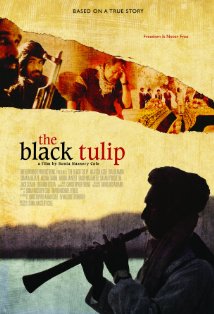Loading AI tools
2010 film From Wikipedia, the free encyclopedia
The Black Tulip is a 2010 film directed by novice Afghan-born American filmmaker Sonia Nassery Cole and starring Haji Gul Aser, Sonia Nassery Cole, Walid Amini, Jack Scalia, and Edoardo Costa. It is set in Afghanistan.[1]
| The Black Tulip | |
|---|---|
 Film poster | |
| Directed by | Sonia Nassery Cole |
| Written by | Sonia Nassery Cole David Michael O'Neill |
| Produced by | Sonia Nassery Cole Chris A. Cole Evans Butterworth |
| Starring | Haji Gul Aser Sonia Nassery Cole Walid Amini Jack Scalia Edoardo Costa |
| Cinematography | Dave McFarland |
| Music by | Christopher Young |
Release date |
|
Running time | 116 minutes |
| Countries | Afghanistan United States |
| Languages | Dari Pashto English Arabic Italian |

The film depicts the fictional Mansouri family who start a restaurant in Kabul named The Poets' Corner, where artists and writers meet.[1] The story centers on Farishta (Cole), the woman who runs the cafe. The Poets' Corner serves wine in teapots and has poetry readings by locals and members of the U.S. military. This ultimately angers the Taliban and they begin kidnapping and assassinating the family and patrons of the cafe.[2]
According to the film's director, Sonia Nassery Cole, a few weeks before the movie was to begin filming in Afghanistan, Taliban militants caught Zarifa Jahon, an actress Cole said she had wanted to cast in the film, and cut off her feet as punishment. Cole then cast herself in the lead role instead.[2] When questioned about the lack of evidence about the event, Cole later claimed that the actress had told her in a telephone call about the amputations, and said that the woman asked her to leave her alone for her own safety. However, Latif Ahmadi, the head of the Afghan Film Organization, said he thought Cole's statement was "propaganda for the film" and he didn't believe it had happened. According to an article in The New York Times, many others in the film industry in Kabul had said they had never heard of such an actress nor of such an episode.[2]
According to Cole, the film's cinematographer, a producer and a set designer had all abandoned her "in the middle of production." Michael Carney, the production designer, who had worked on the film in Afghanistan for two months, said he completed his agreed upon contract which had him leaving four days before the film completed shooting. "I could feel death," said Keith Smith, the original cinematographer. "I didn't sign up for that."[1]
The film was largely financed by Cole.[1]
The film premiered 23 September 2010, at the Ariana Cinema Theater in Kabul, Afghanistan.[2] There were advance screenings at the headquarters of the NATO-led International Security Assistance Force and at the embassy. Some Afghan attendees at the premiere challenged certain scenes in the film as not being faithful to Afghan culture or tradition.[2]
The film was selected for screening as Afghanistan's entry for the Best Foreign Language Film at the 83rd Academy Awards[1][3][4] but didn't make the January shortlist.[5] Two songs featured in the film, "Forever One Love" and "Freedom Song", were also in contention for the Best Original Song Academy Award.[6][7]
On the review aggregator Rotten Tomatoes, 25% of 12 critics' reviews are positive. Critics praised the film's "sense of place",[8] but took issue with acting and "preachy dialogue."[9][10]
Seamless Wikipedia browsing. On steroids.
Every time you click a link to Wikipedia, Wiktionary or Wikiquote in your browser's search results, it will show the modern Wikiwand interface.
Wikiwand extension is a five stars, simple, with minimum permission required to keep your browsing private, safe and transparent.